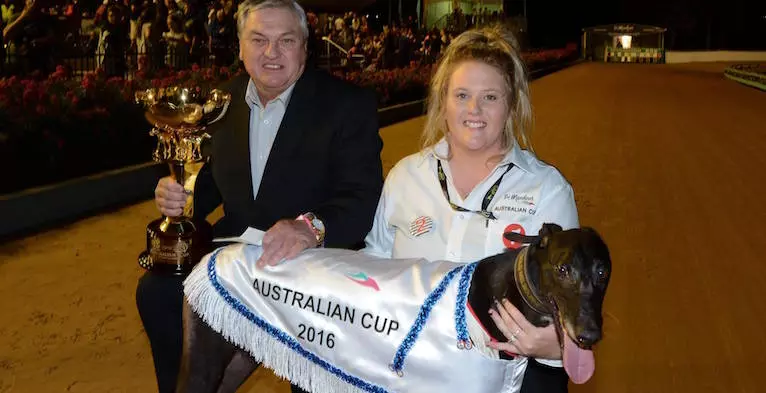Australia’s largest breeder fears no industry in a decade

AUSTRALIA'S largest greyhound owner and breeder Paul Wheeler says he has reduced his breeding figures by 50 per cent and has growing fears the industry may not survive another decade.
Wheeler's admission comes after a series of draft recommendations released by Greyhound Racing NSW (GRNSW) addressing the falling greyhound population and how to minimise its impact on racing over the next 12 to 24 months.
The discussion paper, titled ‘NSW Racing Population Initiatives', revealed the number of pups whelped in NSW throughout 2016 was down 56 per cent on the 2014 calendar year.
Additionally, the last six months of 2016 saw a 73 per cent drop compared to the corresponding period of 2014.
Wheeler acknowledged events such as the live baiting scandal and the greyhound racing ban had shaken the industry, but said the powers which control the sport had a lot to do with the alarming drop in breeding numbers via schemes such as the breeding pink card and placing limits on the number of litters bitches can have.
“The authorities have got [to take] a lot of responsibility for it. Our authorities just don't know what they are doing. They brought the pink card in to try and regulate breeding and I was opposed to do it from day one,” Wheeler told Australian Racing Greyhound.
“They thought it would decrease the number of dogs not making the track, but in my opinion dogs not making a track is not a greyhound issue, it's a human issue.
“It should have been based upon an individual with a breeding licence and if they couldn't get a certain percentage of what they bred on an annual basis to the track, then their licence should be revoked.
“But instead they've put a blanket rule on the actual greyhounds, when in the vast majority of cases it's the people with the greyhounds which are why they don't make it to the races.”
Wheeler said the new rules and regulations, as well as fears over the future direction of the sport, were a large factor in his family, which have owned champions such as Fernando Bale, Dyna Double One, Fanta Bale, Kantarn Bale and Xylia Allen, deciding to dramatically reduce the numbers bred out of their purpose-built breeding facility near Boorowa.
“It's almost impossible to breed with all the rules and regulations they have,” he said.
“We've cut down by 50 per cent and we will keep it at this rate for the next year or two. If we are not happy with the way the industry is going we will be reducing our numbers again.”
Wheeler also said that breeding and racing initiatives won't cut it alone if greyhounds are not being taught to chase effectively. Since 2015, Greyhound Australasia has banned the use of any animal product in the training of greyhounds, meaning no skins, fur or humanely-killed rabbit carcasses.
Going against any other form of canine obedience or training, the rules also mean you cannot use any food rewards like liver treats or treated animal products such as leather, in order to encourage the dogs to chase.
Wheeler said limiting greyhounds to a blue, fluffy squeaker at the track – which they never catch on race day – is going against nature.
“Not only do we have the impact of a reduction in breeding, but of those that are left there is now a higher percentage of those which are marring and failing to chase,” he said.
“I was watching a documentary on wild animals which had been found when they were young and raised by humans who then tried to re-introduce them back into the wild.
“The natural instinct for them to hunt was basically rendered dormant because they hadn't been trained by their parents to do that.
“It's the same thing with greyhounds – there is a natural instinct in greyhounds to chase which is dormant and they have to be trained and taught to do that.
“The way the rules are written now though we can't even kick a leather soccer ball around now to teach them to chase because it's made from an animal product.
“The authorities have got the industry into a ridiculous situation.”
Wheeler now sends a sizeable number of his racing stock to New Zealand where racing is conducted on a finish on lure – meaning greyhounds catch the lure at the end of the race as a reward.
Wheeler – who has built his family's dynasty over the past 50 years and followed on from the teachings of his father Allan – is worried the direction of the sport will soon lead to its demise.
“If it keeps going the way it is, I doubt very much that there will be an industry [in 10 years],” he said.
“The authorities in the horse industry are trying to run it as a profitable industry for its participants.
“The greyhound industry is not doing that. The greyhound industry is bowing and bending over for the animal activists rather than standing them up to them.”
To ensure the sport's survival, Wheeler said the governing bodies need to change tack and start calling on people with industry experience to fill positions of power moving forward.
“The biggest problem in the industry is this government word called transparency,” he said
“They are too afraid to employ people for prominent positions within the authority body which have had experience with greyhounds due to the fear that it may not look transparent and that these people may do favours for their friends.”



